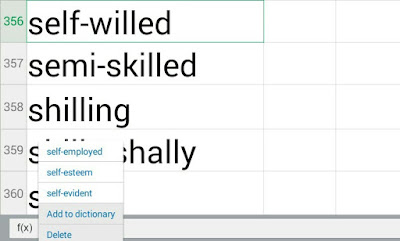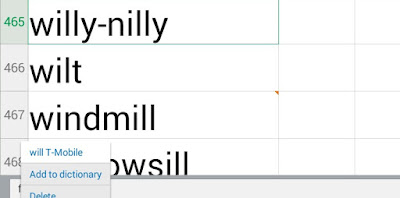Report from the word face
Having finished a rough-cut (very rough) of the *il* section, I'm taking time out to reflect a bit on the Android spell-checker.
Android's spell-checker never ceases to amaze me: its latest suggestion, for "n o-frills" is
"up-front" which does share a hyphen followed by fr, and (though in the wrong places) an "n" and an "o"; but it shares nothing else.
In these five cases I hadn't made a mistake, but Android (or maybe Kingsoft Office – the software I'm using [I'm not really on top of this thing]) still felt I needed some help finding le mot juste:
1
I wonder what's wrong with ill-advised, apart from the general hostility to the hyphen felt by some users of American English (mentioned here). Anyway, I'm impressed by the creativity underlying the suggestions of alternatives.
2
I detect a somewhat Calvinistic value system at work here.3
From stern to surreal. I generally expect my t-shirts to be still. The notion of an autonomous (automotive?) one is rather disturbing.4

I wonder which of these full-time things is the least surreal; or indeed the most. A full-time logo sounds like something Harry Potter might know about, akin to those moving pictures in the newspapers. And what would it do on its day off?5
I think this might be a thinly-veiled comment on T-Mobile's customer service.
Enough of this. Onwards and *ol*wards...
b
(PS... but this word-bashing is pretty arduous, and I have an interesting idea for a real book. So I'll carry on with #WVTbook2 as far as *ul*. Then I'll take stock, and [maybe] change direction.)
Mammon When Vowels Get Together V5.2: Collection of Kindle word-lists grouping different pronunciations of vowel-pairs. Now complete (that is, it covers all vowel pairs – but there's still stuff to be done with it; an index, perhaps...?)
And here it is: Digraphs and Diphthongs . The (partial) index has an entry for each vowel pair that can represent each monophthong phoneme. For example AE, EA and EE are by far the most common pairs of vowels used to represent the /i:/ phoneme, but there are eight other possibilities. The index uses colour to give an idea of how common a spelling is, ranging from bright red to represent the most common to pale olive green to represent the least common.
I'm thinking about doing a native iBook version in due course, but for now Mac users can use Kindle's own (free) simulator.
Also available at Amazon: When Vowels Get Together: The paperback.
And if you have no objection to such promiscuity, Like this.
Freebies (Teaching resources: Nearly 50,000 views and 9,000 downloads to date**. They're very eclectic - mostly EFL and MFL, but one of the most popular is from KS4 History, dating from my PGCE, with nearly 2,700 views and nearly 1,100 downloads to date. So it's worth having a browse.)
And if you have no objection to such promiscuity, Like this.
Freebies (Teaching resources: Nearly 50,000 views and 9,000 downloads to date**. They're very eclectic - mostly EFL and MFL, but one of the most popular is from KS4 History, dating from my PGCE, with nearly 2,700 views and nearly 1,100 downloads to date. So it's worth having a browse.)
** This figure includes the count of views for a single resource held in an account that I accidentally created many years ago.





No comments:
Post a Comment